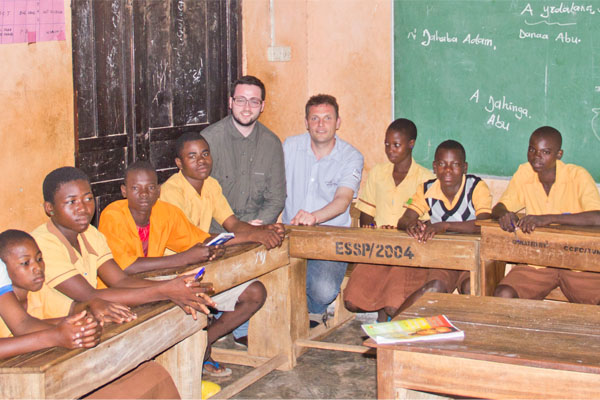1. Background
The culture and traditions of the societies in the project area are those of male domination and respect for the elderly and authority. The result is the culture of silence among children and young people.
This phenomenon plays against the educational and self-confidence development of children. The general apathy in participating in the governance processes of the populace has been partly linked to the cultural orientation. To break this barrier, children empowerment through capacity building, exposure to participatory platforms, as well as actual participation is needed. The strategy is to create space for the voices of children to be heard and to enhance their participation in decision-making, especially in issues that affect their daily life. This is very useful for building a population that supports the deepening of democratic practices and governance.
However, the best stage for a child to build confidence, learn and practice democratic norms and rules is at the school. Yet when it comes to defining their needs, they are treated as objects rather than subjects. This not only holds true for African but also for European countries. In the wake of the world wide diffusion of participatory budgeting, budgetary processes in schools get questioned too in regard to their participative and transparent quality. Furthermore, missing transparency in African school budgeting nurses problems like corruption.
In its essence, by making children’s’ ideas and views visible to the authorities, the project aims at informing the discussion about the School Performance and Improvement plans (SPIP) that serves as basis for allocation of capitation grant. The Capitation grant is disbursed to schools to support school development. The expenditure of Capitation grant is linked to the SPIP. Unfortunately, the development of the SIPS is done without the inclusions of views of children, though they are the direct beneficiaries of the Capitation grant. The project seeks to enable youth’s participation in that their demandsand ideas are heard and considered in the usage of allocated funds and the implementation of measures that shape their surroundings. The project has therefore elements of capacity building and participation, involving children in their role as students in the Savelugu/Nanton Municipality.
2. Objectives
- To promote the inclusion of children in the school performance and improvement planning process
- To promote democratic values among children through Children Democratic Clubs (CDCs)
- To provide a platform for an effective interface between children and local government authorities
3. Target Group
- Primary: Children in three schools (one upper primary and two junior high schools) in the Savelugu/Nanton Municipality
- Secondary: Teachers, School Management Committees, Local Education Authorities
4. Key activities
4.1. Comprehensive engagement of partners and stakeholders
Since establishing new structures and processes within a complex regulated system, the consent and support of various groups of stakeholders and partners is needed. This holds true especially for the school system, where our target group, the children is dependant on regulations from authorities at home and in the schools themselves. Therefore, different meetings and workshops are needed.
Because we want to engage the children in our planned extracurricular activities, meetings for negotiation and consent with school authorities will be necessary as well as with the parents of the children that are selected for participation in the CDCs (see second activity).
The execution of the CDCs will be complemented with a selection of teachers, who will support the project as facilitators. After the selection of the teachers, guideline and procedures for the CDCs will be elaborated in subsequent meetings.
For consent and support it is vital to also incorporate other structures into the process that already connect stakeholders and engage with the management of school related issues like School Management Committees (SMCs) and Parent Teacher Associations (PTA). Therefore, the SMCs, PTAs and the GES being stakeholders of education management will receive project inception briefings. The partners of the project, who will take part in organizing and running the CDCs, will also receive a training on SPIP by an expert trainer in a workshop.
4.2. Design and Implementation of ‘Children Democratic Clubs’ (CDC)
The main activity is the design and implementation of ‘‘Children Democratic Clubs’ (CDC) as a democratic innovation that connects the areas of youth participation and (local) school governance. The members of Children Democratic Clubs will be elected by their peers, giving room for a balanced participation. The three CDCs will each consist of about 12 children and will meet twice a month over the course of 3 months. Since they are already elected by their peers, the senior prefect, the girls prefect and the various class prefects are members by status. Additionally, a contest will be opened up to meet the two boys and two girls criterion in each of the 3 classes for the two junior highs and the one upper primary schools.
In the context of their guidelines, the CDCs will operate as democratic as possible, with the children deliberating and voting on issues and decisions that arise.Before the CDCs commencement of operation, the 36 children will have the chance to participate in a workshop where they will learn what the SPIP is all about and where they will be provided with a participatory and presentation skills training. As a result of this capacity building and the ongoing practice within the CDCs, the members will be able to discuss improvement needs of their schools and make prioritization of those needs. Their ideas and views will be collected and compiled in form of a document called “Children SPIP Reports”.
To make the work and members of the CDC even more visible to their schools and the people of the Savelugu/Nanton Municipal assembly, a debate between the 3 CDCs will be organized. The topic of the debate connects to the current political discussion about whether the District Chief Executive should be appointed by the government or elected by the local people.
4.3. Convening a SPIP meeting for the presentation of the “Childrens SPIP Report”
The third activity of the project aims at bringing representatives of the CDCs together with local education authorities at a meeting for the SPIP. The children will present to them the “Children SPIP Reports”, compiled from the CDCs meetings. In this way, local authorities are confronted with the children’s concerns and input on challenges of the schools. The meeting could also unearth challenges confronting the SPIP and the way forward to addressing them.
Working close with these stakeholders will help to assure the project’s sustainability in particular and to move towards more participative education system in general. The project will then use this engagement with the SPIP as leverage for the adoption of the “Children SPIP Reports”.


